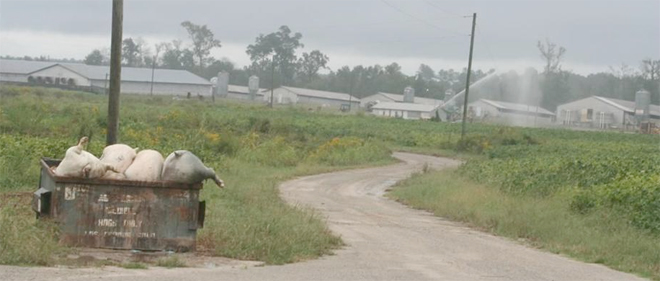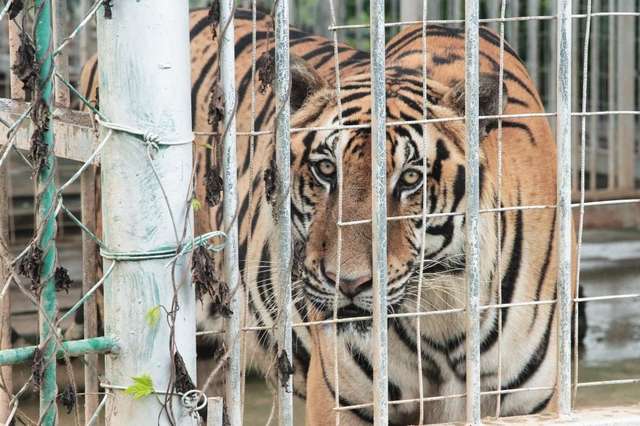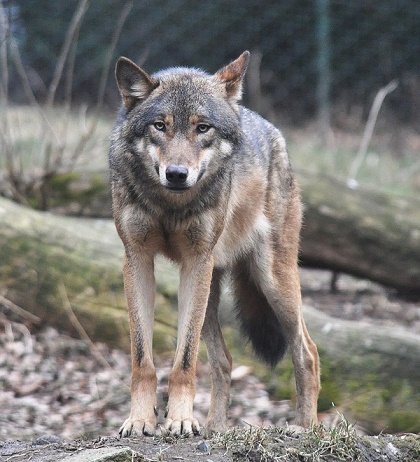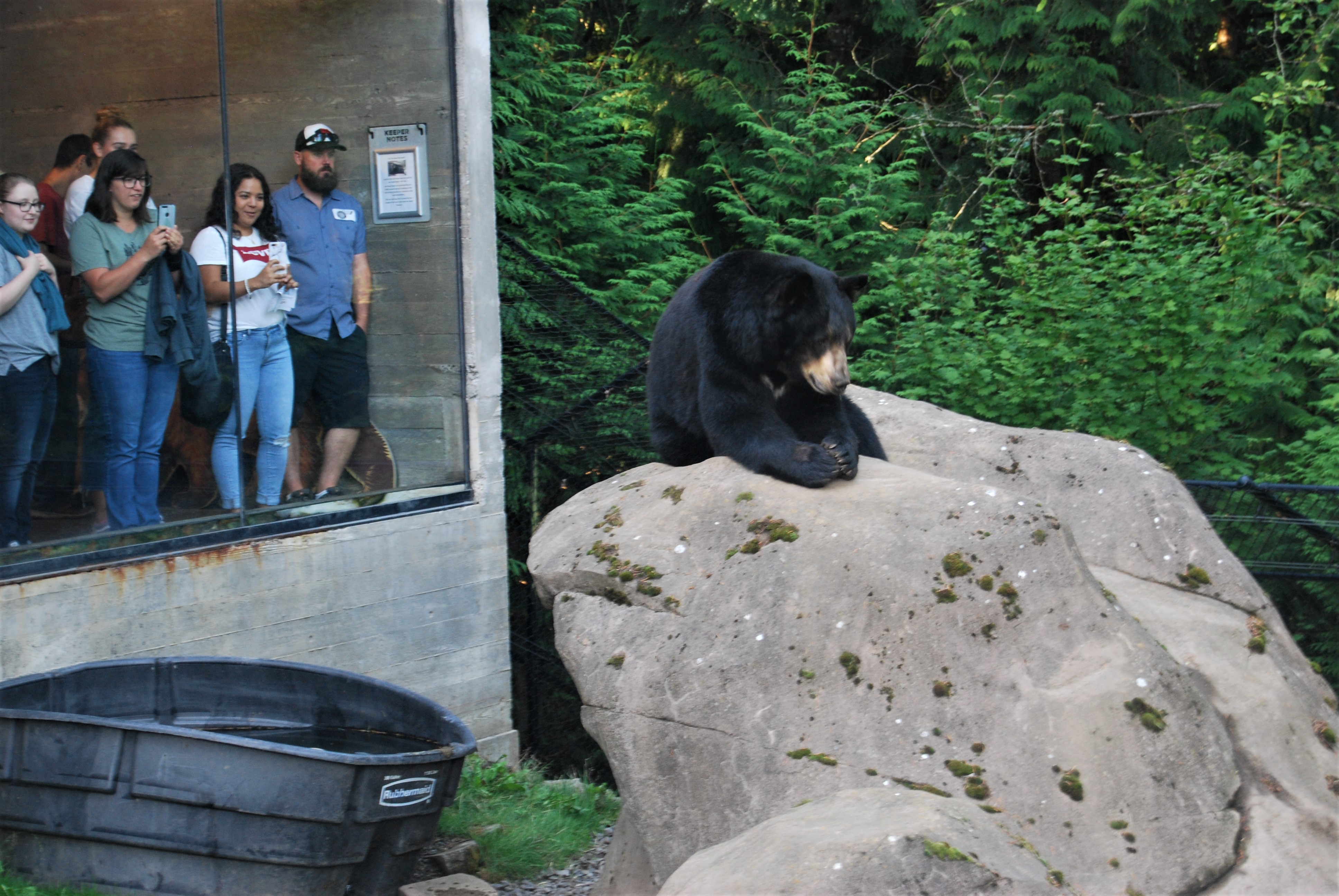Blog
New report connects deaths to animal agriculture.
Meat it turns out is not only a risk factor to human health, but the air that people breathe near farms is literally killing thousands every year. Read the report, it won't make you breathe easier but it is important information to share.

Air pollution from farms leads to 17,900 U.S. deaths per year, study finds
Plant based diets crucial to saving wildlife
Feb. 3, 2021
The global food system is the biggest driver of destruction of the natural world, and a shift to predominantly plant-based diets is crucial in halting the damage, according to a report.
(https://www.theguardian.com/environment/2021/feb/03/plant-based-diets-crucial-to-saving-global-wildlife-says-report?fbclid=IwAR3aa5fACvX6afol89mFRYMSglU13fD81m0--lEYOg0wCHZAHhmW8R2MQ//)
"I was a journalist who reported on captive animals - then I became one."
August 2020
Marc Bekoff, professor emeritus of Ecology and Evolutionary Biology at the University of Colorado, Boulder, interviewed journalist Christina Russo, who after undergoing painful surgery and months of recovery, had a satori moment of awakening about the plight of captive animals in zoos. You can link to her story from this article.
(https://www.psychologytoday.com/us/blog/animal-emotions/202008/deeper-sympathy-the-plight-captive-animals//)
 April 2020
April 2020
The tiger in the room
Lately the news is abuzz about tigers. First there was Tiger King, the Netflix series that catapulted Joe Exotic, the bizarre owner of a tiger petting zoo into the spotlight. Sadly the series barely touched on the problem of exploiting tigers for profit. Then there was coronavirus, and a tiger named Nadia at the Bronx Zoo where Nadia and her fellow tigers contracted the virus from a keeper. The pandora's box of dirty secrets about tiger exploitation is now open for all to see.
Let's examine a few of those dirty secrets.
Tiger farms. Traditional Chinese Medicine (TCM) makes use of many tiger parts. Tigers are kept in small cages and then killed and harvested for their body parts.The penis is supposed to impart virility. It is forbidden in the West but in several Asian countries, including Laos and Cambodia, it has been used in potions, balsams, liqueurs, etc. The paws are used to combat insomnia. Teeth for fever. Fat to treat rheumatism and leprosy. The nose as a treatment for superficial wounds. Bones as an anti inflammatory. The bile for convulsions in children with meningitis. The brain for laziness. Feces for hemorrhoids and alcoholism.
And then there's tiger wine, made from the bones of tigers.
Chinese and Hong Kong governments have been trying to fight the clandestine trafficking of animals linked to TCM, but this tradition persists. Take action here.
Petting zoos. Tiger King did expose these private for profit enterprises, but failed to fully explain the crueltly to tigers. Tigers are bred several times a year and their cubs are taken from them at or near birth and given to paying customers to hold and pet. The cubs cry and suffer from being torn from their mothers. Then when the cubs are too old for petting, at around 12 weeks, they are sold or disposed of. The Big Cat Proection Act was initiated to end the private ownership of these cats. Take action here
Canned hunts. Captive hunting operations are private trophy hunting facilities that offer their customers the opportunity to kill exotic and native animals trapped within enclosures. Some facilities have even allowed their clients to kill animals remotely via the internet. Tigers and other endangered animals are sold by private breeders, circuses and zoos. Take action here.
Trophy hunting. Tigers, along with lions, elephants and hippos are popular targets for trophy hunters who often pose with their dead prey for a selfie. Despite being listed as endangered, big game hunters pay license fees of $10,000 per animal and more to kill them. Sign here to ban trophy hunting.
Disease. With the discovery of the coronavirus in a tiger at the Bronx Zoo, fear has ignited about the transmission of zoonotic diseases. Animals in zoos have no choice about who they come in contact with, and they are susceptible to many human diseases, elephants often contract TB in zoos and circuses. And it also brings home the realization that no tiger belongs in the Bronx Zoo, or in the possession of any private owner or public;y funded institution. To stop the exploitation of tigers in zoos and other entertainment venues, boycott these venues.
When we think “tiger” the first thought should be Africa or India, not the Bronx Zoo or Joe Exotic. More tigers now live in captvity than the wild. Something like 5,000 at a minimum, more likely, are in captviity, and less than 4,000 live in the wild. There are many organizations working to save wild tigers. Here is one.
The “fearful symmetry” of William Blake's tiger is now a caged shadow of its former self.
Tyger Tyger, burning bright,
In the forests of the night;
What immortal hand or eye,
Could frame thy fearful symmetry?
In what distant deeps or skies.
Burnt the fire of thine eyes?
On what wings dare he aspire?
What the hand, dare seize the fire?
And what shoulder, & what art,
Could twist the sinews of thy heart?
And when thy heart began to beat,
What dread hand? & what dread feet?
What the hammer? what the chain,
In what furnace was thy brain?
What the anvil? what dread grasp,
Dare its deadly terrors clasp!
When the stars threw down their spears
And water’d heaven with their tears:
Did he smile his work to see?
Did he who made the Lamb make thee?
Tyger Tyger burning bright,
In the forests of the night:
What immortal hand or eye,
Dare frame thy fearful symmetry?**
William Blake
May, 2017
Thinking of adopting a plant-based diet? Jenreviews outlines the science that supports that decision.
20 Health Benefits of Going Vegan, According to Science (+6 Delicious Vegan Recipes)
February, 2017
RIP Packy

Oped in the Oregonian
By Guest Columnist Courtney Scott
In a recent opinion piece, ("What Packy Taught Us," Feb. 14)
Oregon Zoo Director Don Moore leaves out the most important lesson that Packy provided to the world. Namely, that elephants do not belong in captivity.
They don't belong in circuses - Ringling Bros. has finally admitted that and retired their elephants. And they don't belong in zoos. For nearly all of Packy's 54 years he was confined to a one-acre exhibit with a cement-floored barn and viewing cage. Packy could be seen pacing in his cage and yard, which is similar to how prisoners pace in their cages. Packy's medical records showed that he had arthritis, joint disease, foot disease and for the last three years, tuberculosis. These ailments aren't seen in wild elephants. TB is only seen in elephants who have contact with humans.
However, as Team Packy stated, Packy was not showing signs of suffering from the TB, and elephants can often live a long time with this disease. He was improving after being taken off TB drugs, which were severely affecting his health. So it is debatable that Packy had to be killed at this time. The decision to put him down raises the question of whether the zoo plans to bring in more elephants to replace him. Moore has often spoken about the need to save elephants in Borneo and the zoo even brought over an expert from Borneo to speak about the plight of elephants there.
As to the lessons about elephants that the zoo has learned, there are a number of wild elephant experts who are already informed about the attributes Moore mentions. They have studied elephants where they live in their range countries for many years and know that elephants can communicate with one another through seismic vibrations, exhibit empathy towards other species, are self aware, mourn their dead and show so many more wonderful behaviors. Elephants do not behave the same in captivity as they do in the wild, so what people learn from zoo elephants is not always helpful to understanding how a wild and free elephant lives and behaves.
Oxford researcher Dr. Keith Lindsay said at a recent animal welfare conference that the money that is spent on elephant exhibits in a zoo - for instance the $58 million that taxpayers spent on Elephant Lands - could fund an elephant refuge in Africa for eternity. The same applies to elephant sanctuaries in Southeast Asia.
Confining these massive, highly social and intelligent animals for life to learn a few lessons about their behavior is cruel and inhumane--and unnecessary. Our hope is that Packy's sad life and untimely death will awaken the world to the need to end the breeding of elephants in zoos, so that no more Packys are born into lifetimes in captivity. We also advocate that the Oregon Zoo halt any plans to import more elephants from the wild. The zoo already has an elephant from Malaysia, Chendra, who exhibits profound stereotypical behavior. In Packy's honor, she should be sent to sanctuary. In addition, we strongly urge the zoo to halt its use of bullhooks as many other zoos have already done, including all zoos in California.
We support the Oregon Zoo's program to conserve Northwest species and we encourage the zoo to continue along that path. But it is time for the world to recognize the truth about life and death for elephants in zoos.
Packy deserves that.
January, 2017
Ringling Brothers: the end of an era
Ringling Brothers Circus Will Shut Down Forever
August 8, 2016
Does killing wolves save cattle and sheep?

Wolves have been targeted by livestock ranchers for ages. They are routintely shot on the ground or gunned down from helicopters. Despite their still recent delisting from the endangered species list, wolves are again under the gun for their supposed role in killing sheep and cows on rangelands. But is this reputation for predation on lifestock really earned? And are there are other ways to protect sheep and cows other than killing predators such as wolves? National Geographic explores this subject. Why Killing Wolves Might Not Save Livestock
"A new study has found that—paradoxically—killing a wolf can increase the risk that wolves will prey on livestock in the future."
National Geographic
*And something to ponder--what if the number of cattle and sheep being raised for meat was dramatically reduced because there were far fewer meat eaters? Logically, the targeting of wolves and other predators would dramatically diminish.
July 20, 2016
Is it time to close zoos?
Since the death of Harambe the gorilla in the Cincinatti Zoo recently, the internet is afire with calls to close zoos. Are zoos necessary to conserve species? Is confining large exotic animals like elephants a necessary price to pay for educating children about these animals? Here is one article that explores that question by quetioning human entitlement to seeing wild animals in captivity.
September 6, 2015
Why do we have such a powerful connection and appreciation for elephants? This has been true throughout human and elephant history. Maybe because in so many ways, elephants are like us.
